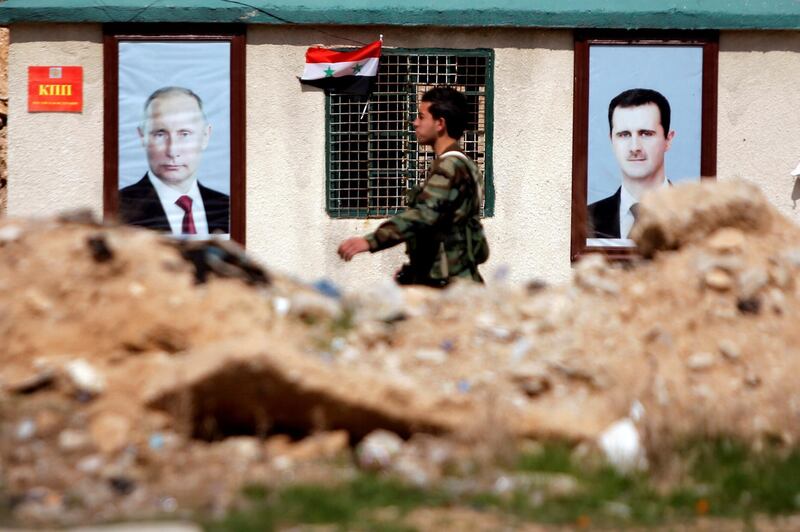The Syrian government on Tuesday announced the beginning of an offensive against ISIS-held neighbourhoods in a Damascus suburb.
The operation comes as the insurgent group appears to be increasingly on the offensive in the country's east, despite President Bashar Al Assad's government and its Russian patrons declaring victory over them in December.
Although stripped of most of the land it once controlled in Syria and Iraq, ISIS still holds areas that straddle the border between the two countries and continues to carry out guerrilla attacks on both sides.
On Monday ISIS-affiliated media announced an attack against a Syrian army checkpoint near the city of Albu Kamal, in addition to a series of assaults on Mr Al Assad's forces, reportedly killing hundreds and even recapturing some territory.
Residents of areas taken back from ISIS last year told The National that assassinations, bombings and attacks by the group's fighters remain a threat.
“It is certain that the organisation is not far away from the areas it controlled,” said an attorney from the eastern Syrian city of Deir Al Zour who asked to remain anonymous.
The attorney said that while he did not support ISIS, the government’s recapture of the area had not been popular with everyone.
Civilians are slowly beginning to come back, explained the attorney, "but services are not available in these areas."
“The forces of the regime and its militias looted everything in the areas they controlled houses and shops, then burned them. [The regime] is also pursuing young people of recruitment age for compulsory military service.”
The Syrian Observatory for Human Rights, a Britain-based group that monitors the country’s seven-year-old civil war has recorded the deaths of more than 200 Syrian government troops in the last month in ISIS attacks. It has also reported that the insurgent group still controls some oil wells in the area - at the height of their success, it was oil and gas fields that provided the group with millions in revenue, driving its expansion.
The areas of eastern Syria that were previously under ISIS are now split between Russian-backed government forces to the west of the Euphrates River and the Syrian Democratic Forces (SDF), a militia backed by the US, on the river’s eastern side.
_______________
Read more:
Trump’s Arab force: discussions 'early' but could be for 'training'
Exclusive: Notebook found in Raqqa prison reveals ISIS's thirst for blood
_______________
The Syrian government forces around Deir Ezzor are an amalgam of Syrian, Iranian, Afghan, Iraqi and Lebanese militiamen, as well as Russian troops and military contractors.
“We’ve certainly seen some ISIL attacks that have resulted in (Syrian) regime soldiers' deaths, particularly in Albu Kamal,” said Colonel Ryan Dillon, a spokesman for the US-led coalition fighting ISIS in Iraq and Syria.
While the US airstrikes against ISIS are ongoing in Syria, American-backed ground operations have been stalled since March, when fighters from the largely Kurdish SDF redeployed from positions in eastern Syria to fight a Turkish military incursion further west, near the predominantly Kurdish city of Afrin.
“We as a coalition and the SDF have put up obstacles to contain ISIL in those two locations and are conducting strikes, but (Afrin) has slowed down operations in that area,” Col Dillon said, using a different acronym for ISIS.
Concerned that ISIS is using Syria as a staging ground for attacks inside Iraq, Iraqi fighters recently suggested they might cross the border to join Iraqi fighters already fighting alongside the Syrian government in eastern Syria.
Recent attacks forced Iraqi prime minister Haider Al Abadi to admit late last month that the battle against ISIS was in fact far from over despite declaring victory last year.
“We’ve always known that ISIL is not just going to walk away – we’ve always known they’re going to find hiding areas in the desert in Iraq, and even holding out in populated areas,” Col Dillon said.
“They can quietly reconsolidate in areas where they are contained. On the western side of the Euphrates River, It would be apt to say they operate more freely, just because of their ability to transit across the entire country,” Col Dillon said, referring to territory controlled by the Syrian government and reports that ISIS fighters had moved from eastern Syria to central Syria earlier this month.
“We know that the Iraqis are concerned – they are addressing what is happening in Syria and how it impacts their borders,” Col Dillon said.





